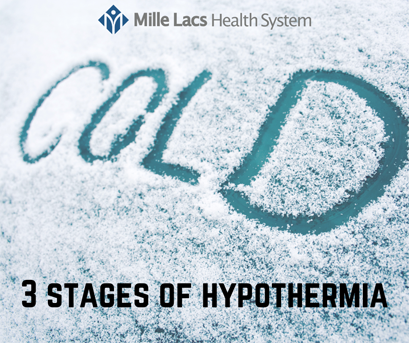Three stages of hypothermia
January 6, 2023
Hypothermia is a real concern during the winter months, but it is something that can occur during much of the rest of the year as well.
Hypothermia is caused by prolonged exposure to cold temperatures. When exposed to cold temperatures, your body begins to lose heat faster than it’s produced. Lengthy exposures will eventually use up your body’s stored energy, which leads to lower body temperature. Hypothermia begins to set in once the body temperature falls below 95 degrees Fahrenheit.
While hypothermia is most likely at very cold temperatures, it can occur even at cool temperatures if a person becomes chilled from rain, sweat, or submersion in cold water.
Certain populations are more susceptible to the cold and can develop hypothermia much easier. Individuals both old and very young can be at greater risk, as can others with specific medical conditions, those taking certain medications, or individuals using drugs or alcohol.
According to the CDC, early signs of hypothermia include shivering, exhaustion, confusion, fumbling hands, memory loss, numbness, increased heart rate, and breathing, slurred speech, and drowsiness. In babies, the signs are bright red, cold skin, and very low energy.
Beyond the symptoms listed above for mild hypothermia, there are two other stages to watch for called moderate and severe hypothermia. The moderate stage of hypothermia typically shows an even more decreased state of consciousness, the body transitions from violent shivering to no longer shivering, and the heart rate slows/lowers as does the breathing rate and blood pressure.
Finally, in the severe state of hypothermia, the person is often unconscious or unresponsive, muscles may become rigid, the heartbeat will be very slow, and can become irregular. If a person is found in this condition, use caution when moving the person to a warmer place as even simple movements can trigger cardiac arrest in this state.
A few steps you can take at home to try to warm a person in the early stages of hypothermia include:
- Get the person into a warm room or shelter.
- Remove any wet clothing the person is wearing.
- Warm the center of the person’s body—chest, neck, head, and groin. Slow indirect heat is the safest way to rewarm the body. Do not use hot water or heat lamps. You can also use skin-to-skin contact under loose, dry layers of blankets, clothing, towels, or sheets.
- Warm drinks can help increase body temperature, but do not give alcoholic drinks.
- After the body temperature has increased, keep the person dry and wrap their body, including their head and neck, in a warm blanket.
For anyone in the advanced stages of hypothermia, seek medical attention immediately.
